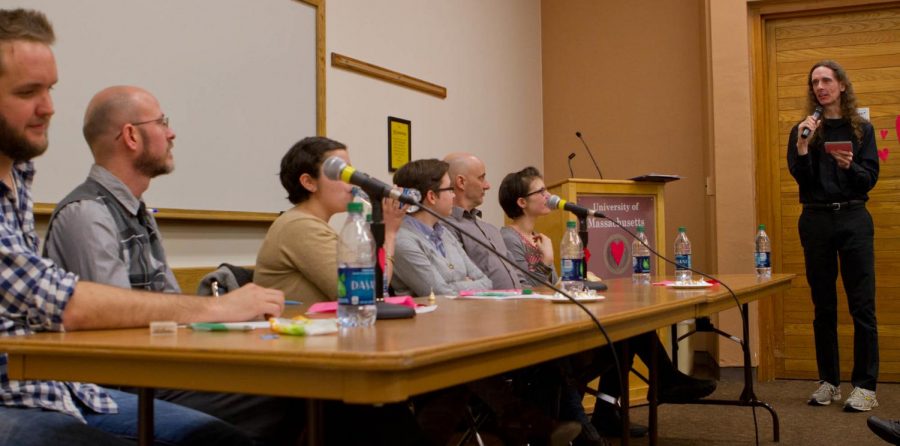Editor’s note: This article has been corrected to accurately reflect Lou Sullivan’s role as a founding member of the GLBT Historical Society. A previous version of this article referred to him as the founder.
Genny Beemyn, director of the Stonewall Center at the University of Massachusetts, was honored with the first Lou Sullivan Torch Award for their work in scholarship and advocacy for transgender inclusion on college campuses.
Beemyn was recognized for their work to support trans students, which includes “writing books and articles, giving talks, consulting with colleges and maintaining a database of colleges with trans-supportive policies,” according to a press briefing from UMass News and Media Relations. They were presented with the award on Friday, Sept. 27 in Washington, D.C. Beemyn also participated in the inaugural National Trans Visibility March in D.C. on Saturday, Sept. 28.
“I have been a leader, a pioneer in doing research on trans college students, what their experiences are, what their needs are,” said Beemyn. “I wrote some of the first articles to address trans students back in the early 2000’s and have been speaking about this ever since then and doing research, writing articles and books.”
Lou Sullivan, the award’s namesake, was a trans activist, historian and writer best known for his publications, including the first “guidebook” for trans men. Through his activism in San Francisco, Sullivan became a prominent voice for the experiences of gay trans men. Sullivan was also a founding member of the GLBT Historical Society, an archive of material relating to LGBTQ history in the United States.
“It’s very much an honor to be a recipient of an award in the very first set of awards that they gave out,” said Beemyn. “Especially one named for an individual, Lou Sullivan, who was a real pioneer in trans activism. To be receiving an award that’s named after someone who was a real leader in our community means a lot to me.”
In addition to being director of the Stonewall Center, Beemyn is the coordinator of Campus Pride’s Trans Policy Clearinghouse and the co-chair of International Pronouns Day, which began in 2018 and takes place annually on the third Wednesday in October.
“It was something that we started last year to call attention to the importance of asking and respecting pronouns, people sharing their pronouns, and not making assumptions about how people gender themselves,” said Beemyn. “We thought that having a day, we would be able to focus greater attention on it.”
This year’s International Pronouns Day took place on Oct. 16 and was highly successful, garnering attention across social media.
“It’s been really wonderful to see how it’s really grown from the first year, when it was mostly in the U.S., because we are a bunch of U.S. activists, to really starting to be international,” said Beemyn. “It was the top trending hashtag internationally on that day, which was really awesome.”
The Stonewall Center at UMass was founded in 1985 as a response to “a series of anti-LGB incidents in 1984,” according to the Center’s website. The Center, located in Crampton Residential Hall, was first founded as a center for lesbian, gay and bisexual students at the University. The Center’s official name was expanded to include trans students in 1995 and asexual and intersex students in 2014. Beemyn was appointed as director of the Center in 2006.
“UMass has been a pioneer in providing support to lesbian, gay and bisexual students,” said Beemyn. “At the point I came here, [UMass] was not doing very much to support transgender students, and I thought that was something I could make a real difference in.”
When the Center opened, it was the third of its kind on a college campus. The Stonewall Center has served as a model for the more than 150 LGBTQ campus centers and offices that now exist on college campuses throughout the United States and Canada. The Center serves the Five Colleges and the surrounding community by providing “cultural and educational programming” such as LGBTQIA+ allyship training, a DVD and book library, community outreach and support and advocacy for LGBTQIA+ individuals on campus.
“The Stonewall Center really set the standard for what a[n LGBTQ+] center should look like, what it should do,” said Beemyn. “I would say we’ve been a leader in doing transgender work. Over the last decade, we’ve been one of the schools, I believe, at the forefront of doing policies in support of trans students.
“I’m constantly being asked by other colleges, ‘How did you do this? What is your secret? How do you get people on board?’ That’s gratifying, to see other colleges look to us as being a leader and want to follow in our footsteps.”
Ana Pietrewicz is an assistant Op/Ed editor and can be reached at [email protected].




















